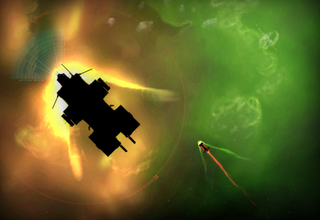Deep-space smuggling in Heat Signature

Procedurally generated Hotline Miami levels floating through space—that's a rough approximation Tom 'Gunpoint' Francis' new game, Heat Signature. I played it today, and the premise of stealthily boarding enemy spaceships to steal packages and/or kill targets is enormously exciting, and makes this something of a 2D Han Solo simulator (had Han Solo actually done any smuggling in Star Wars).
Heat Signature can be controlled almost entirely with the mouse. Piloting the spaceship is as simple as clicking in the direction I want to go. The more I zoom out from my ship with the wheel, the faster I can make the ship move by clicking farther away from it. Arrows point to nearby ships cruising through space. To board, I have to stay out of the ship's line of sight and gently dock at an available gate.
It's initially quite tricky to grasp the trajectory of my ship's movement, but like docking in Elite, there's a satisfaction to landing first time with no drama (which I managed twice—not so much every other time). Messing up the approach and being spotted by an enemy vessel will always end with a payload of missiles unleashed at my ship. That can be avoided with a little careful manoeuvring, or by blasting away from danger at full speed. Mastering how the ship moves and deliberately provoking enemies is something I could see myself spending a lot of time doing in the finished game.
When you board a vessel, the game switches to on-foot combat from a top-down perspective that's clearly Hotline Miami-inspired. I fluff this bit almost every time. Enemies shoot on sight and it's a one-hit kill—probably too tough in its current form. Francis wants to include a varied arsenal in the finished product, but in this build my character just has a pistol. With each respawn, players can choose to be a thief or an assassin, which determines whether their boarding objective is stealing packages or assassinating a target. I'm a thief. Jumping into a computer on an enemy ship gives me the location of a package, which I can then head off to steal on another, much larger ship—in all cases but one it ends with me being shot dead.
Heat Signature is a permadeath game, but on-foot, there's a way to carry on after being shot, if you're good enough (spoiler: I am not). If you take a bullet on an enemy ship a guard will pick you up and toss you out of the nearest airlock. At this point, you can hit tab to take control of your pod and retrieve your floating corpse before a timer runs out. Doing so resumes progress from where you died.
This might be my favourite single idea in Heat Signature, not because I actually manage to find my floating body and carry on—nailing both the speed and precision is pretty tricky, and the closest I get is sailing past my body at almost full speed two seconds before the timer runs out—I just think certain players will torture themselves by trying to do this every time. Like everything in Heat Signature in its current state, it's tricky but it can be learned.
I ask Francis what the end game of acquiring packages is and he says he's not sure there will ever be one. This is Heat Signature, floating through an endless universe, encountering spaceships of different sizes, speeds and threat levels. Francis is keen to add space stations, too, which will no doubt help the universe feel a little more varied. The plan is you'll play as a range of characters, each with their own individual stories and motivations—Francis cites a bloody revenge tale as one possibility, for example. Like Gunpoint's script, I'd expect a light narrative touch that just adds a little colour and lore to this pretty, randomised universe.
The biggest gaming news, reviews and hardware deals
Keep up to date with the most important stories and the best deals, as picked by the PC Gamer team.
Gunpoint was a confident debut and Heat Signature is an obviously more ambitious follow-up—even at this stage, I feel like Francis is borrowing from the right places to flesh out this original concept.
[For full disclosure, Tom Francis used to work for PC Gamer, although I never personally worked with him].
Most Popular

